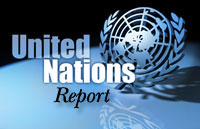Britain continues to pressure UN to censure Zimbabwe (FCN, 04-13-2007)

UNITED NATIONS (FinalCall.com) – Zimbabwe was elected to chair the UN Commission on Sustainable Development (CSD), the panel that deals with development and the environment, on May 11. The chair traditionally rotates among regions of the world. Under UN protocol, this was Africa’s turn in the one-year seat, and the 53-member African Group chose Zimbabwe.
The Commission, which meets annually in New York, was established by the General Assembly in 1992 to monitor the follow-up of the Earth Summit held in Rio de Janeiro in June of that year, and to forge implementation of key environmental and development agreements. The Commission’s session for 2007 opened on May 9, focusing on energy for sustainable development, industrial development, air pollution and climate change.
Leading up to the vote, Britain and other Western nations decided to mount a rearguard offensive to block Zimbabwe to no avail.
“Countries are determined to block the move,” Tom Casey, a U.S. State Department spokesman said. “We don’t think Zimbabwe would be a particular effective leader of this body,” he added before the vote.
British Ambassador Sir Emyr Jones Parry told reporters that his government was opposed to elevating Zimbabwe at the UN. “We’re waiting for the outcome of the vote but, clearly we’d prefer another African country to chair the committee,” he said.
“We do not find Zimbabwe the right country to head the CSD,” Erik Solheim, the Norwegian Development Minister, in New York for the conference told reporters.
The Commission was forced to hold a secret ballot, which found Zimbabwe garnering 26 votes in favor to 21 against, with three abstentions. There are 12 African nations serving on the commission.
After the vote, Western nations continued to show their disdain.
“We really think it calls into question the credibility of this organization to have a representative from a country that has decimated its agriculture, that used to be the breadbasket of Africa and now can’t feed itself,” stated Daniel Reifsnyder, the U.S. deputy assistant secretary for environment. “We are very disappointed,” he said.
The British ambassador, who left a black-tie affair to witness the vote, condemned the election as “wholly inconsistent” with the Commission’s aims.
However, Zimbabwe’s Minister of Environment and Tourism, Francis Nhema took the high-road after the vote.
“I think we are going to bring transparency, while working together with every nation for the common good of improving our environment. We need to build trust between the North and the South; between the developed and the developing countries, so that whatever we plan we may implement it,” Mr. Nhema said.
“I think when you look at the world it is now a global village, we need each other. We need to assist each other against global warming; and we need to make sure our programs are directed at improving the environment,” Mr. Nhema stressed. “It is not a case of Zimbabwe, it’s a case of everyone in the world working together,” he said.
African diplomats would not comment about the vote in the corridors of the UN, except to say that Zimbabwe was the African choice.
In the May edition of the New African magazine (www.Africasia.com), South African President Thabo Mbeki, addressing a recent meeting of the Southern African Development Commission (SADC) in Dar es Salaam, Tanzania, is quoted as saying: “The fight against Zimbabwe is a fight against us all. Today it is Zimbabwe, tomorrow it will be South Africa; it will be Mozambique; it will be Angola; it will be any other African country. And any government that is perceived to be strong, and to be resistant to imperialists, would be made a target and would be undermined.”
Zimbawe’s President Robert Mugabe also attended the meeting; and in an interview with the same magazine, was asked, “Why should Africa stand with Zimbabwe?”
Pres. Mugabe answered: “Well, obviously, our cause is their cause. The success of Zimbabwe is their success. And we don’t live in isolation. We are not an extension of Europe, we are part of Africa, and so really our stand, as a fight, should be seen as an African cause, and wherever we have Africans, be they in the Diaspora or in Senegal or Ghana, where we first got our revolutionary drink, they should be able to understand and appreciate the war we are fighting.”












